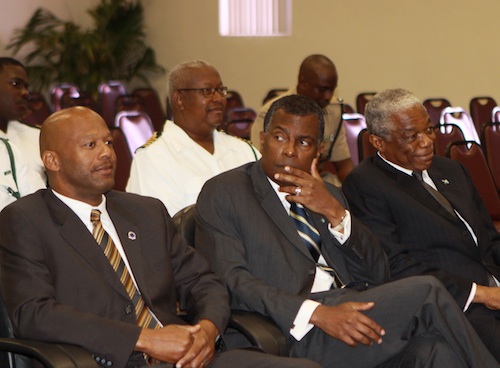Above: Bahamas Foreign Minister Fred Mitchell (centre) (BIS Photo)
By the Caribbean Journal staff
Following a meeting in the Dominican Republic at the end of October, the Dominican Republic and the Bahamas are holding a second round of bilateral talks on a range of issues including maritime security.
The lead issue was the problem of alleged illegal poaching by Dominican fishermen in Bahamian waters. National Security Minister Dr Bernard Nottage called the outcome of the talks “extremely important.”
“We cannot downplay the long-term effects of illegal poaching, as it can lead to a depletion of our country’s marine resources,” Nottage said. “The economic impact of indiscriminate poaching can touch the core of our livelihood. We must deal with it at all costs, as it is an aggravating situation that is becoming even more problematic to regulate, particularly with the advanced technologies that are being deployed.”
Dealing with the problem, particularly by monitoring, capturing and holding those found fishing illegally, puts an additional strain on the Bahamas’ finances, he said, and becomes “very burdensome on our nation’s corrections systems.”
Nottage called the recent talks in the Dominican Republic “very forthcoming and productive,” focusing on issues including trade and investment, agriculture production and maritime law enforcement, among others.
They also “led to the convening of this Round Table discussion to continue the dialogue with an operational team from the Royal Bahamas Defence Force, and representatives of the Dominican Republic navy,” he said.
The focus of Tuesday’s discussions was on information exchange and cooperation with respect to maritime law enforcement.
“The presence of our Dominican neighbours here today to assist in framing an understanding that we can all live with in dealing with our maritime law enforcement issues, is indicative of their understanding and sensitivity to the problem of illegal poaching that The Bahamas faces,” he said.
He said the two sides intended to produce the draft framework of a memorandum of understanding by the end of the talks.
“We have come to realize over the years that if we are going to protect our natural resources and prevent nefarious trafficking activities, we must move with deliberate haste towards making guarding our waters a priority,” he said.
